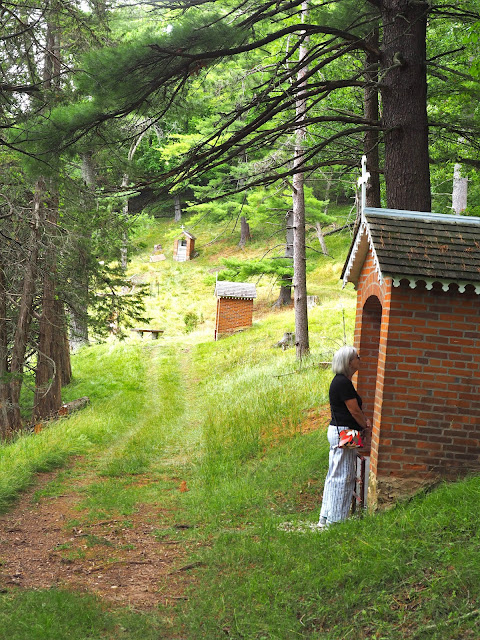I suppose he's an unlikely character to appear at the center of the altar of an old Catholic church in what appears to be an ancient European village but is little more than a tiny town just south of Dubuque. He's something of a surprise because he appears to be a Roman soldier and, in fact, is--or was--and there lies the tale.
It's St. Donatus, who stands at the heart of the altar of a church named after him in a town named after him. In one hand, he holds a palm branch, and in the other what seems a handful of bolts of lightning. St. Donatus of Muenstereifel (as opposed to a dozen other St. Donatus-es) was, in fact, a Roman soldier, young, bold, courageous, charismatic, but something of an outlier because he had been raised Christian by his widowed mom--and that made all the difference.
The older I get, the more I enjoy Roman Catholic iconography, the old-fashioned pageantry of the saints and their incredible, mythic stories. I'm not about to convert, but the role of religion in our lives grows more mysterious every time I step into an old Catholic church like the one in St. Donatus, Iowa, where the house of worship clings to the edge of a hill so steep that climbing is all but impossible if there's been any rain at all.
As a portrait, this shot from the rear may be somewhat unbecoming; but the valley is grand, isn't it? And the Lutheran church way out there on the other side is very much worth mentioning--so much well-meant religiosity, two huge and greatly beloved churches packed into little more than a half mile, not a city in sight.
The fact is, people do climb the rugged hill behind St. Donatus Catholic Church in St. Donatus, Iowa. They climb the steep edge because out there, clearly established for pilgrims is a rugged path that takes believers past the Stations of the Cross, one of very few outdoor stations anywhere in America. Almost certainly, those paths would have been full of people had you and I been there on Good Friday last.
No one, I'm sure, would approximate the arduous and unforgiving path up the side of the hill to the horrific passion of Christ; but if you take up one of the wooden crosses left conveniently at the start, if you carry a cross like one of these with you, you'll know, once you've come back down the hill, that you've been on a journey.
Call it a "roots" thing. I can't help but think it odd that in the two places where I've lived most of my life, I've been in little Dutch Reformed hamlets right beside similarly sized clans of Luxembourgers. Never had much to do with them, but my dad worked with them and for them for years when I was a kid, and, as can be imagined, never really got along well, a Calvinist in St. Donatus's court. Look at that space between St. Donatus church and the Lutherans on the other side of the road--we're not the same even if we're cut from the same cloth. Piety has its own record of wrongs.I want to know more about my Luxembourgian neighbors here in Siouxland, the same neighbors we had some 500 miles east on the shoreline of Lake Michigan.
A good place to start is with St. Donatus, of St. Donatus, this Roman soldier and martyr. My religious history, as often told, begins with nailed-up thesis on the door at Wittenburg. This young Roman soldier makes the Reformation feel like something close to yesterday.




No comments:
Post a Comment